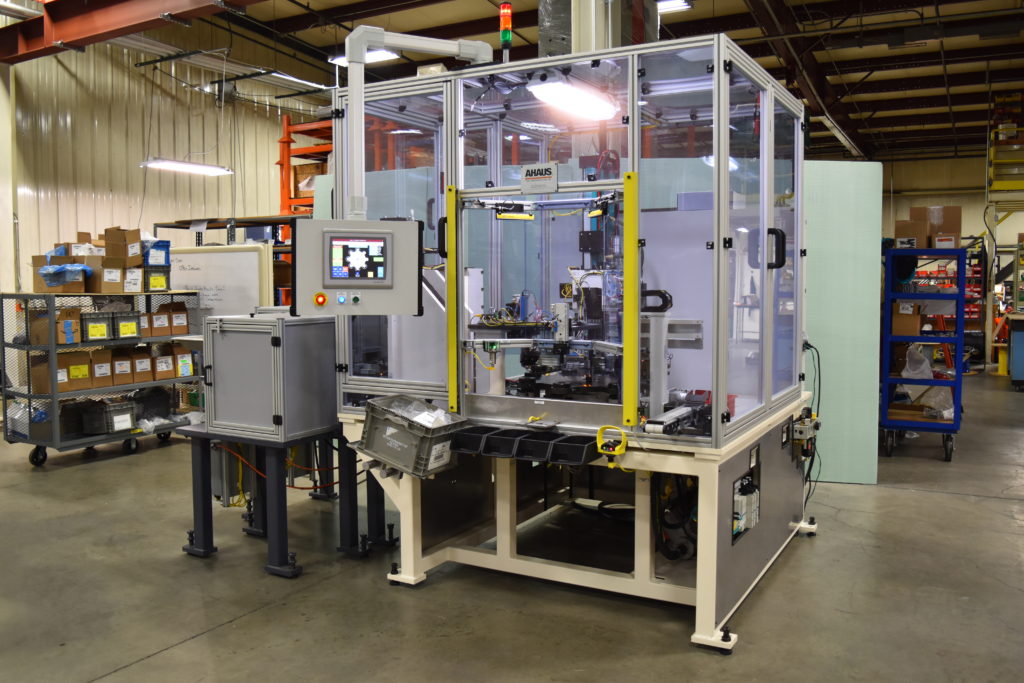Medical device production operates under some of the most stringent quality and regulatory requirements of any industry. Tight tolerances, high-mix product lines, and cleanroom conditions are just some of the challenges, while global demand for advanced surgical and diagnostic devices continues to rise. Manual processes alone cannot meet the required speed, scale, and repeatability. Automation is no longer optional—it’s foundational.
Automated Solutions for an Unforgiving Environment
The medical sector faces increased complexity at every level: smaller devices, biocompatible materials, and evolving FDA and ISO standards. Production goals are aggressive, labor availability remains inconsistent, and product lifecycles are shorter than ever. Automation addresses all of these challenges simultaneously.
“Ahaus is able to partner with companies of any size, but understanding customer’s automation needs, tight tolerances, and special handling required by the medical industry is a key factor to success,” said Kevin Ahaus, President at Ahaus.
“The smaller it gets, the tighter the tolerances. One big push right now is weekly targets of these precision products. It’s a lot of pressure for an engineer or assembly manager and it’s very technical work. We at Ahaus build in the reliability and quality the customer can count on.”
Fully integrated automated systems not only increase throughput, they maintain dimensional accuracy down to the micron level, reduce scrap, and remove variability from critical processes like assembly, welding, and adhesive dispensing. For medical manufacturers, that consistency translates directly into fewer nonconformances, less downtime, and better regulatory outcomes.
Strategic Engineering Support from Design to Delivery
Automation for medical applications often begins before the first component is machined. Workholding, fixture design, part orientation, and quality assurance systems must be aligned from the earliest engineering phases to avoid bottlenecks during production. Ahaus provides comprehensive support across automation, workholding, machining, controls integration, and program management. This breadth allows for scalable, turnkey solutions—from concept sketches to validated equipment on the production floor.
“Whether it’s workholding or automation or machining, we’re able to understand the critical components and provide turnkey applications to make sure products are manufactured and assembled correctly,” said Chuck Haager, Director of Business Development at Ahaus.
“When we partner with companies, we become an extension of their engineering department. Whenever they’re overloaded or feeling pressure, we can take the project from a blank sheet of paper to final assembly, and then follow up with regular support. We have a 100% commission rate; we stick with the projects and make sure that they’re commissioned 100% on our floor and on our customer’s floor.”
Surgical Device Production: Speed and Precision, Zero Margin for Error
Surgical tools, implants, diagnostic cartridges, and catheter components demand micron-level accuracy and often involve complex geometries or soft materials. Robotic assembly, vision-guided inspection, and high-speed pick-and-place systems are now standard in many medical production environments.
The vast majority of global medtech manufacturers have adopted automated systems for inspection and assembly in response to increased demand and workforce limitations. Automated vision systems and in-line sensors enable real-time quality checks with traceability, minimizing defects and accelerating release to market.
“We program our quality control and vision systems based on the exact parameters the customer specifies,” added Kevin Ahaus. “Motors, actuators, sensors, lasers—we’re talking about integrating them into their equipment so they can ensure that they’re getting the final product right the first time; we understand what it takes to do that.”
Ahaus designs its automation systems with quality assurance built in—from fixture tolerances to software logic. Integrated inspection using cameras, lasers, and displacement sensors ensures defect-free output at high volumes. Repeatability is engineered into every station, minimizing reliance on operator skill and maximizing process control.
Medical Manufacturing with Purpose
Products manufactured through automated processes in this sector directly affect patient outcomes. High-precision automation reduces risk, improves quality of care, and ensures access to devices that meet clinical requirements.
“Medical advances happen every day, with more and more products and procedures looking to treat or help people—the kinds of products that are going to help make all of our lives better,” said Jeff Sheridan, Vice President at Ahaus. “We like the types of companies that are in this business because they’re generally focused on doing good, which goes along with the Ahaus focus and vision of being ‘Built for Good.’”
Long-Term Partnerships, Long-Term Performance
Beyond initial system delivery, Ahaus supports its automation platforms with ongoing service, upgrades, and performance optimization. Engineering and support teams remain engaged, ensuring that systems continue to meet compliance and performance standards as product requirements evolve.
“The bottom line is if there are any issues or if there are changes needed or enhancements down the road, we’re going to continue to be there over the long term to support our customers,” said Sheridan. “It’s a growing industry, and we want to be positioned to help this industry and these companies grow.”
Next Steps
Automation is embedded in every successful medical manufacturing operation. Ahaus brings decades of experience designing specialized assembly and automation systems for the medical and surgical device sectors—helping manufacturers scale production while meeting the strictest industry standards.
To learn more about Ahaus’s medical device automation capabilities, contact our team directly.


